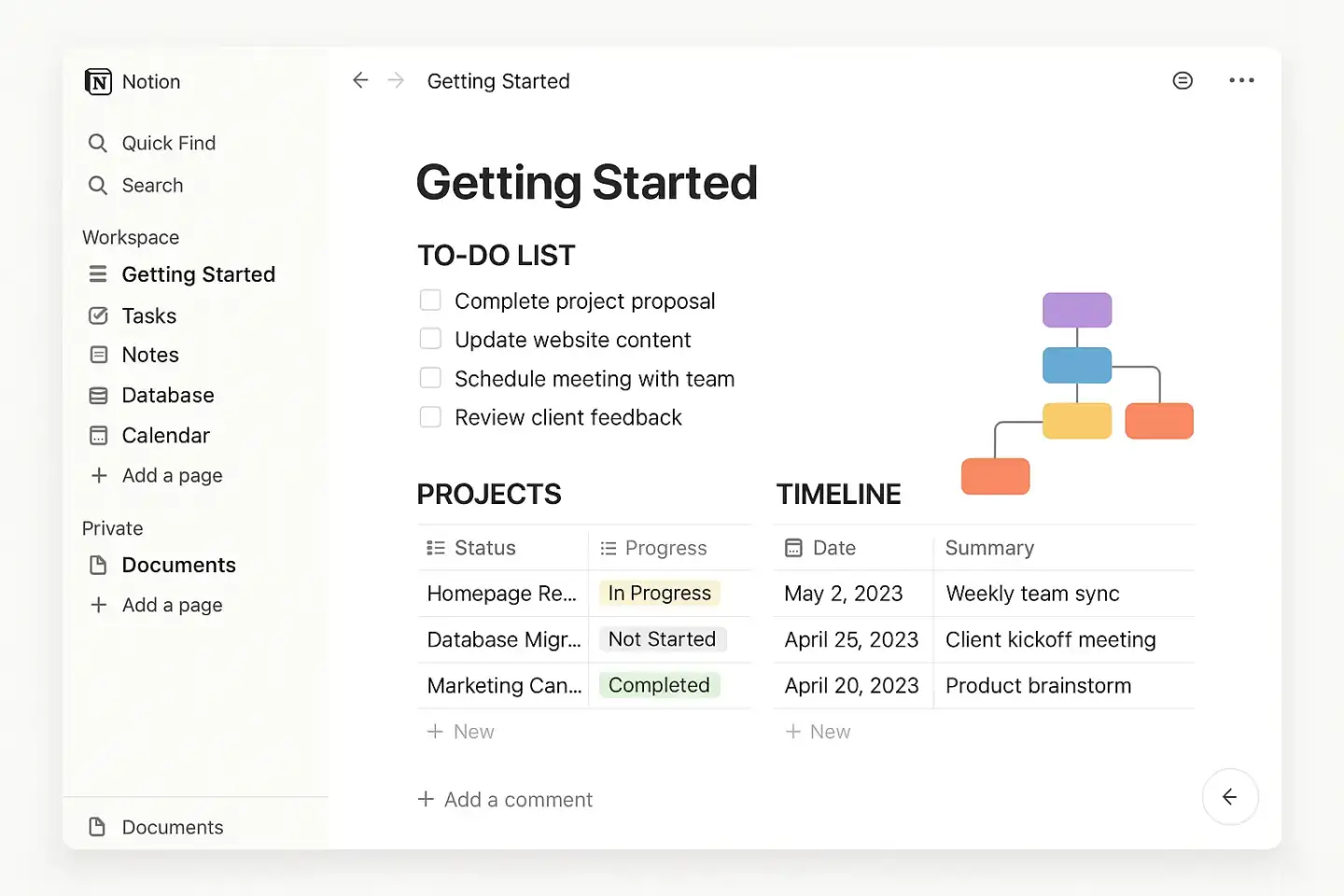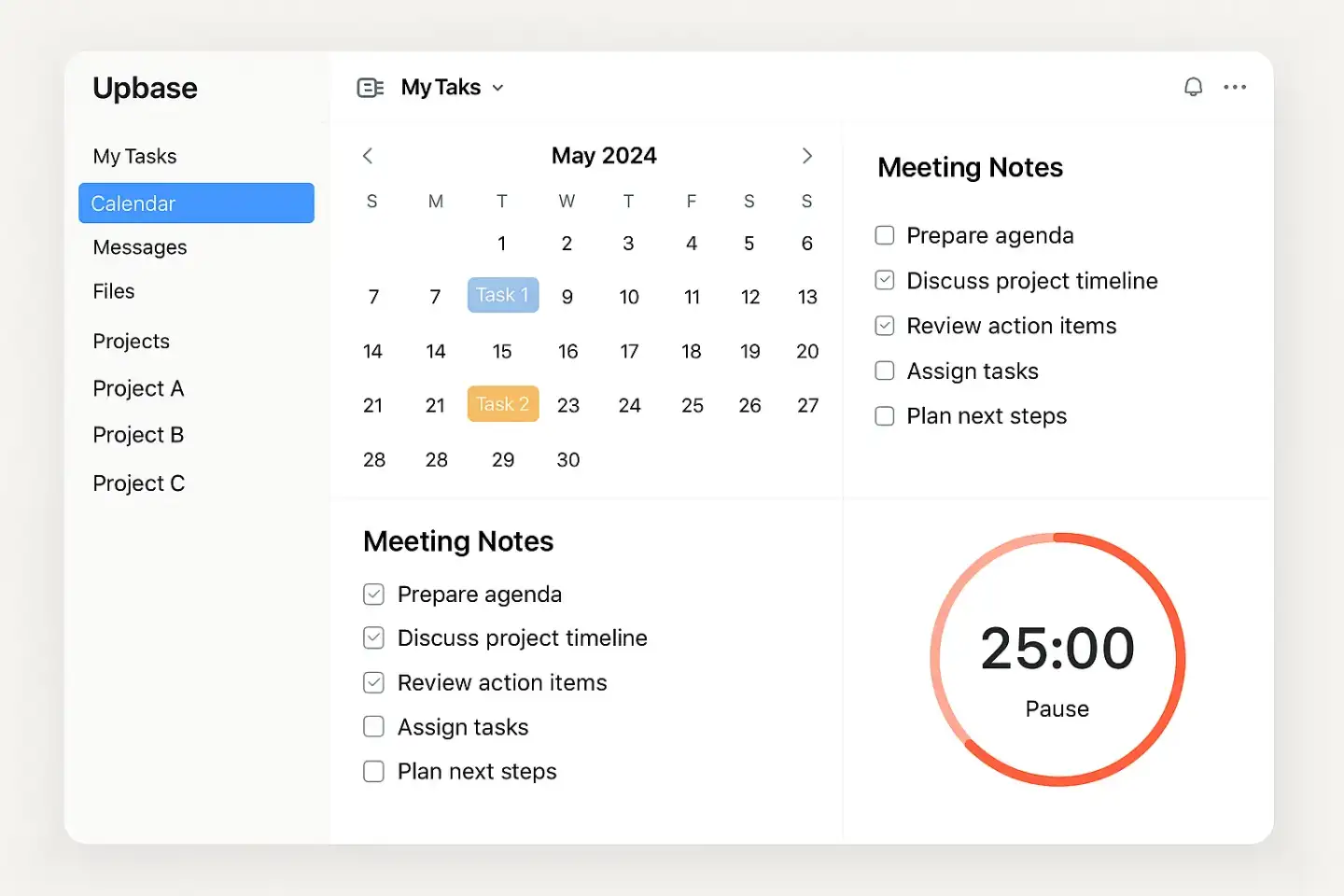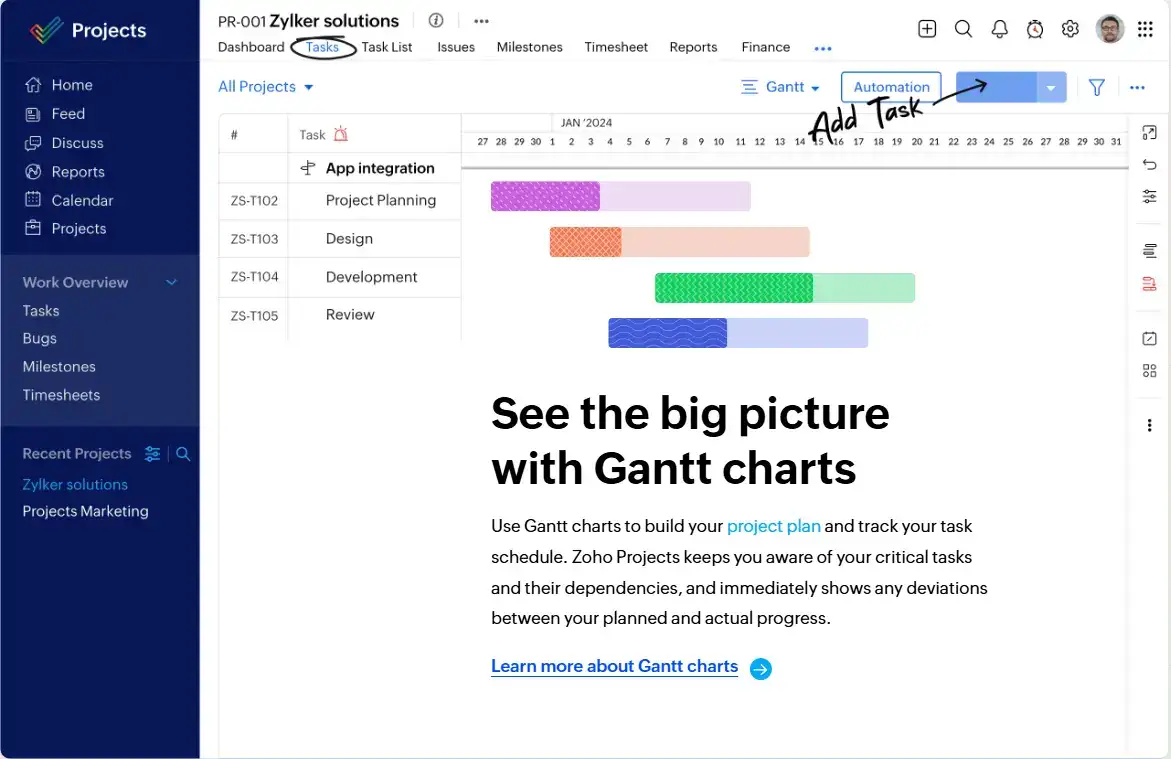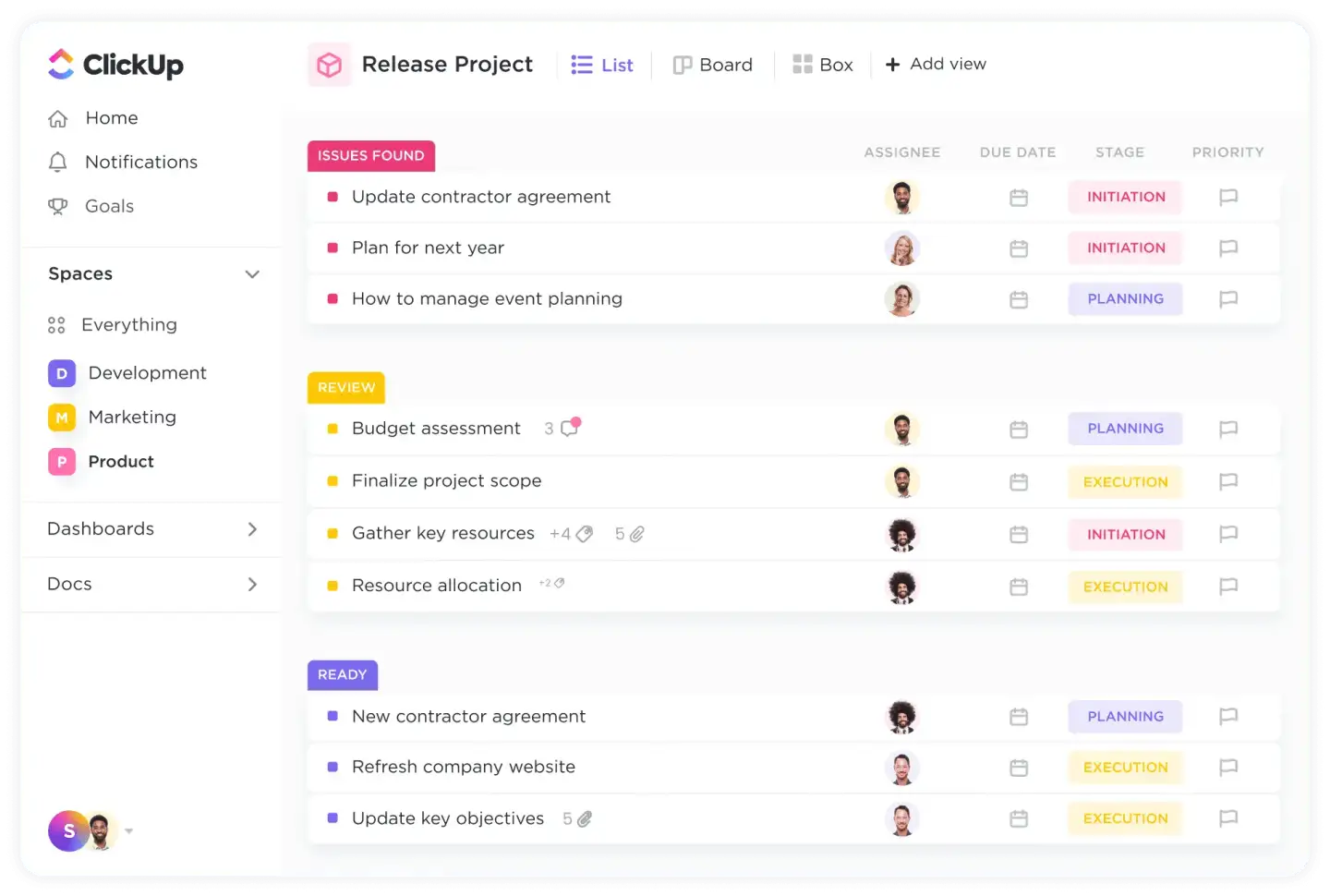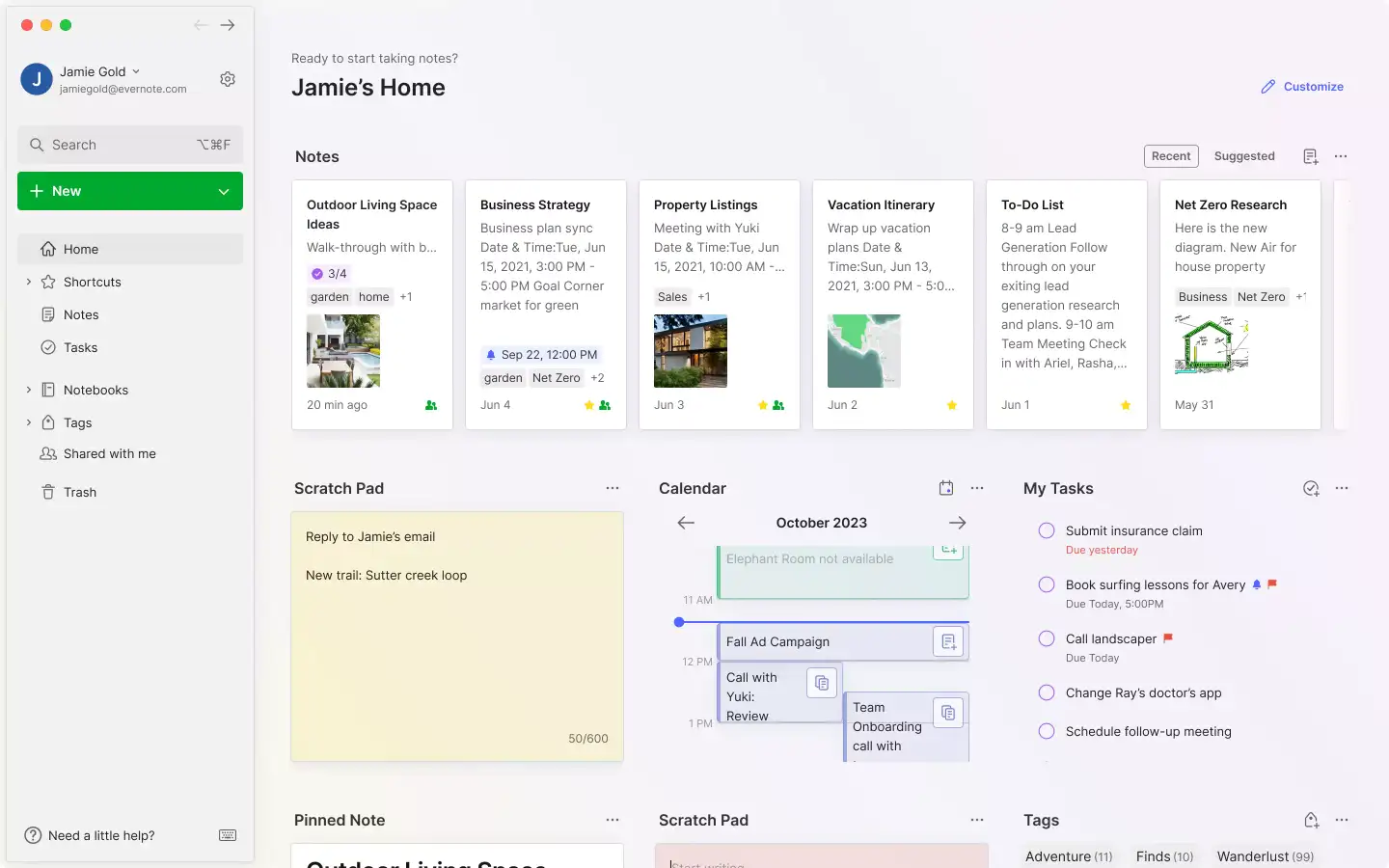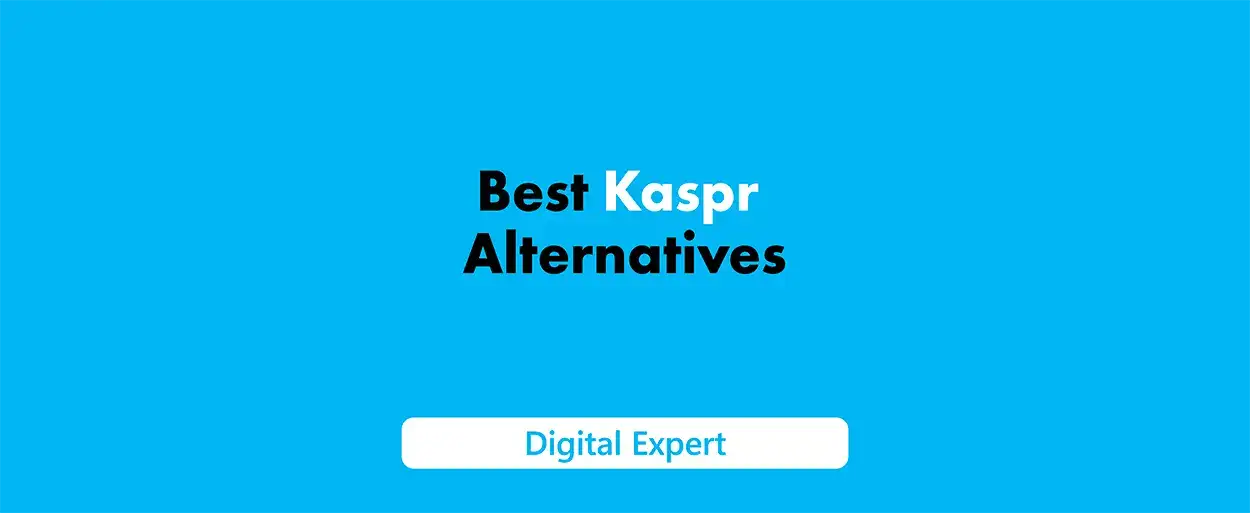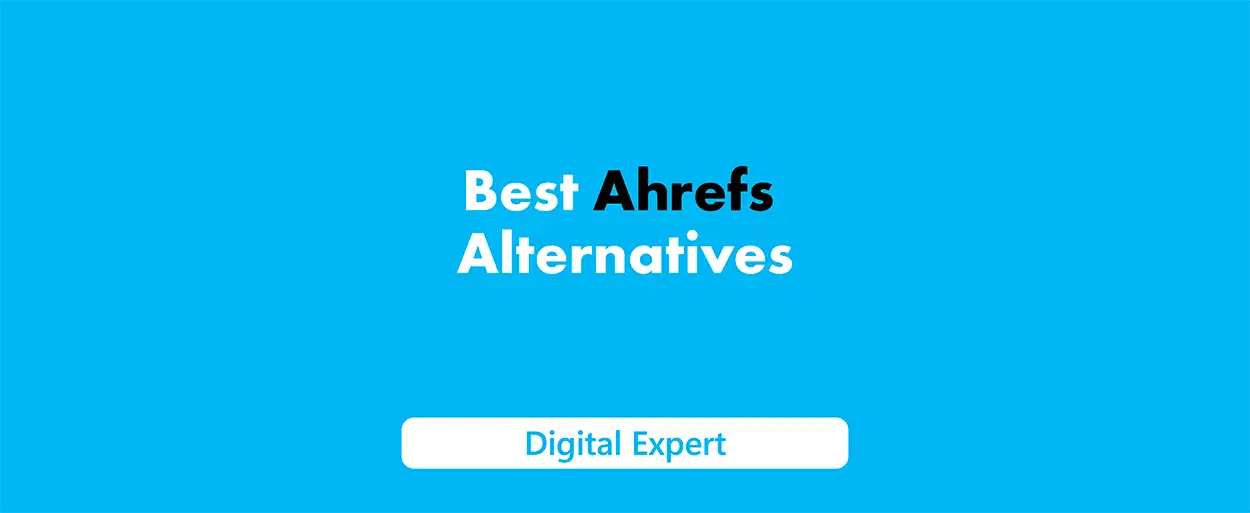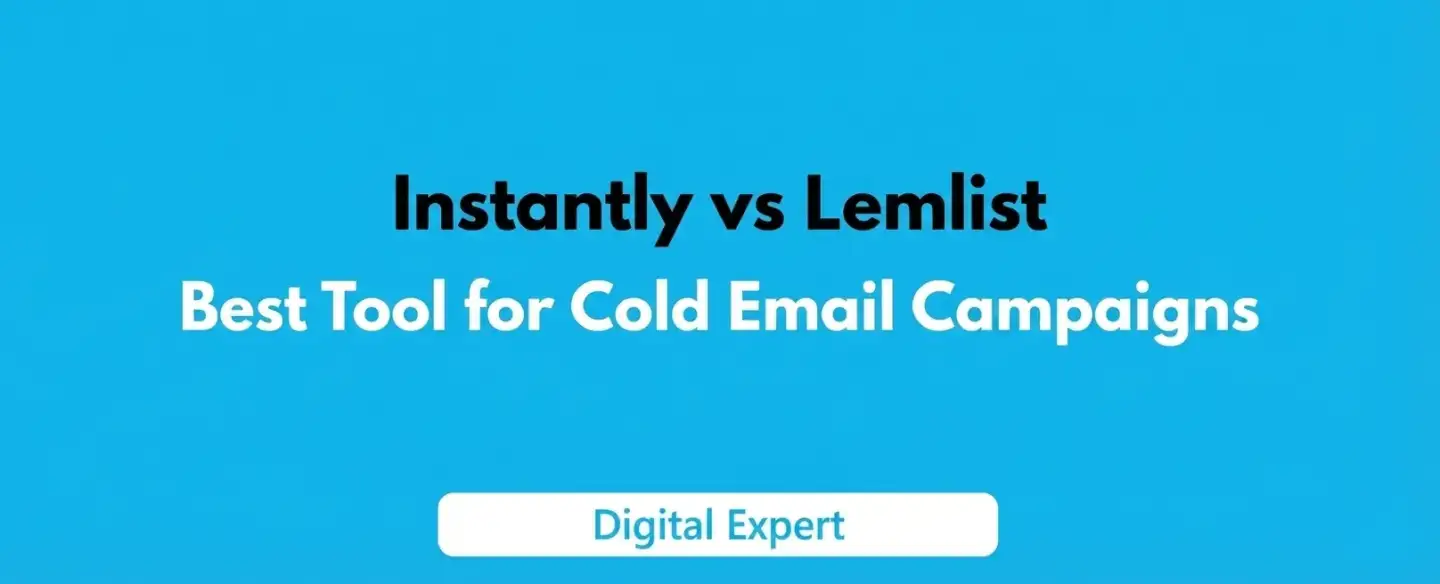Notion is a great all-purpose workspace because it mixes notes, databases, tasks, and wikis in one place. Since it is both flexible and customizable, many people and teams use it. But because it is so complex, some users have reported performance issues; therefore, some people might prefer Coda instead, which offers an easier solution for those who want something less detailed.
That’s why many look for Notion alternatives—tools that offer similar functionality with simpler interfaces, specific features, or better performance in certain areas. Alternatives like Upbase, Zoho, ClickUp, OneNote, Evernote, Anytype, and Google Keep are strong because they each have their own advantages depending on what you look for in a productivity app.
You can go to the best planner app on our website. There you can find and choose the best option for your business :)
What is Notion?
By using Notion, people can conveniently gather their notes, tasks, databases, calendars, diagrams and documentation in one system. It combines features from Google Docs, Trello and Evernote and gives the user a flexible workspace that can be used by individuals or teams. Because of its drag-and-drop feature and use of blocks, anyone can create anything from short to-do lists up to complicated knowledge bases or organizational systems that can include notifications for task updates.
Organizing work and information is a common use of Notion by freelancers, students, startups, and large organizations. Yet, because it can be tricky to use and needs the internet, some people choose simpler mobile apps or solutions easier to understand. That’s why many turn to Notion alternatives or this blog post that better match their specific needs, whether it’s simplicity, offline access, or working in an offline mode for tighter integration with other tools.
Top 6 Best Notion Alternatives in 2025
Upbase
Best for: people who want to stay organized and handle their work by themselves
Overview:
The app Upbase blends various tools such as meeting notes, notes, tasks, calendar, Pomodoro timer and focus helpers.
As it is designed for people who work on their own, it has clear lists and Kanban views, commenting and tags—a great fit for organizing work without dealing with team features or getting interrupted by team members. Tracking projects in Upbase is convenient with list boards or kanban boards.
Pros:
A clean interface that is easy to use
There is a to-do list, Pomodoro timer and a way to block distractions.
Integration between notes, tasks and calendar works very well.
An all-access space for your tasks, notes, files and chat in one app
Cons:
It cannot work well for teams.
There is no way to play without an internet connection.
There are not any integrations for Slack or Google Calendar.
Has few advanced tools such as management of user roles and Gantt charts.
Pricing:
Higher plan offers unlimited tasks and notes.
A Premium plan (about $5 each per user if billed annually) gives users access to more storage and export options.
Zoho (Notebook + Projects)
Best for: businesses that want to use email on a budget for their teams
Overview:
Zoho Projects provides functional features for small teams and productive teamwork. Zoho offers a modular alternative to Notion with two main tools: Zoho Notebook for note-taking and Zoho Projects for task management.
You access notes, checklists, images and audio using a card-based interface in Notebook. Tasks are managed using records, charts and keeping in touch with team members online. When used as a pair, they are a Lightweight option similar to Notion for small companies.
Pros:
Many options to set up workflows, access useful tutorials and apply automation
The ability to create and use customizable project processes and automation
Good data security and admin access is necessary.
You can get a free plan for both tools.
Cons:
It takes a lot of practice to understand and its user interface feels busy.
There are no built-in databases in Notebook and its connection to Projects is not very strong.
Using the different parts of the platform seems a bit difficult at times.
Pricing:
Notebook: The basic plan is free (with 2GB), while premium starts from $3 per month
There is a free plan for up to 5 users, followed by paid plans from $4/user/month (if paid annually).
A 10-day free trial is provided.
ClickUp
Best for:if you need a platform with various team tools and document options
Overview:
Docs, tasks and whiteboards are combined within ClickUp which provides the convenience of viewing kanban boards, timelines and lists. Tasks, docs, chat, whiteboards and automation are all included in one powerful workspace called ClickUp.
It's a top Notion alternative for teams, letting you create notes (ClickUp Docs), turn them into tasks, and manage everything from one dashboard. Provides time tracking, goal-setting and useful tools including ClickUp Brain which uses AI to assist.
Pros:
Docs, Kanban, Gantt, Whiteboards, Chat are examples of rich features.
Connection between notes and tasks that works smoothly
No limits on users or tasks in the free plan
Workflows that can be tailored and effective search tools
Cons:
It takes a lot of time for new users to get comfortable with the software due to its complexity and lack of ease of use.
It may look as though there is too much information on the screen.
Issues with performance in places with many users
Desktop experience is more effective than the mobile one.
Pricing:
Can use the free plan forever and assign as many tasks as you like. Paid plans:
Unlimited – costs $7 per user per month
Business – it costs $12 per user each month
Custom – Pricing
You can go to the best note taking apps for Mac on our website. There you can find and choose the best option for your business :)
Microsoft OneNote
Best for: taking notes with drawings and media files in note form
Overview: OneNote, being developed by Microsoft, integrates easily with Microsoft apps and applications Outlook and Word. OneNote comes from Microsoft and works as a free digital notebook using pages, sections and notebooks as its structure.
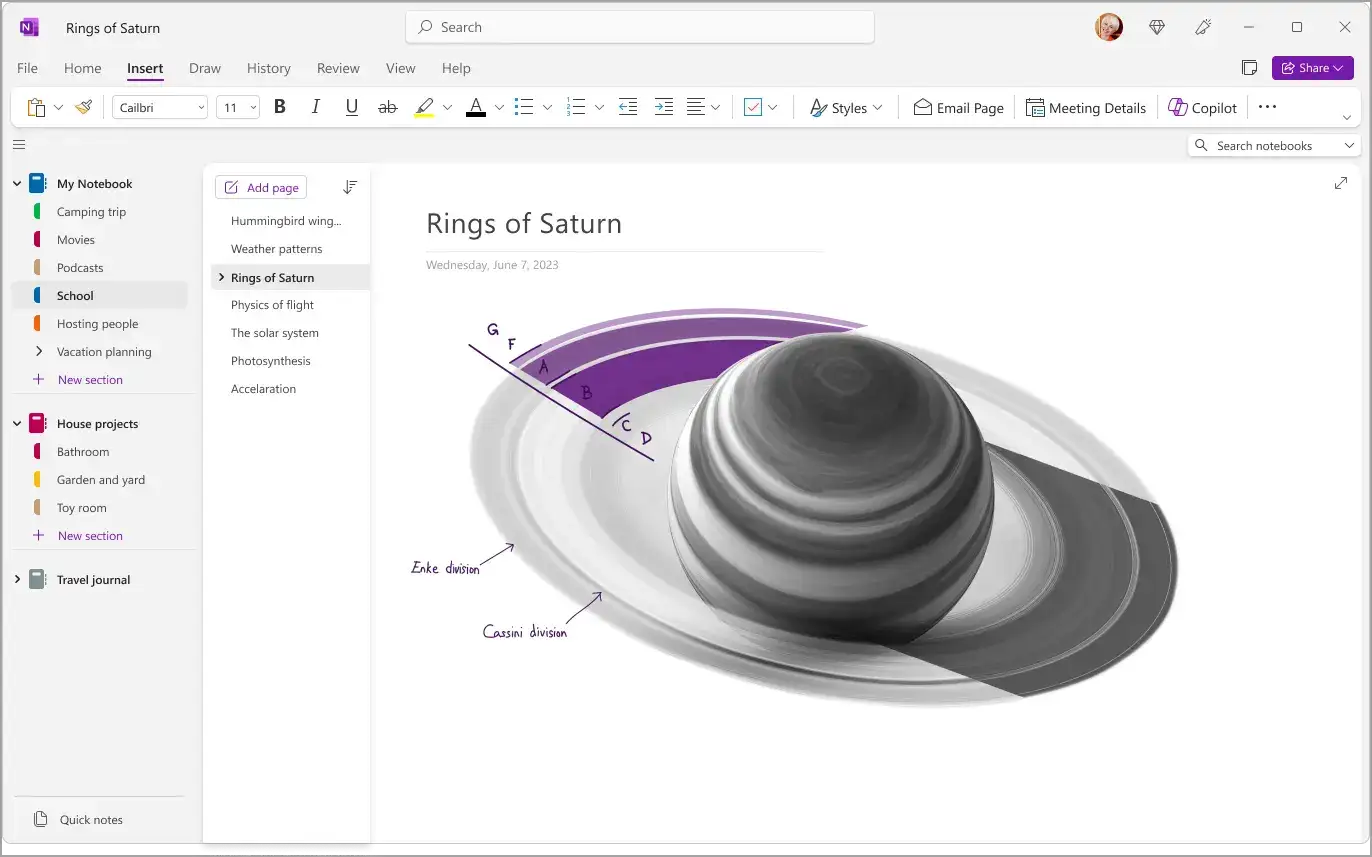
Freeform writing, drawing, adding images, sound recordings and handwritten text are all possible. Powered by Microsoft 365, you can work offline and all your OneDrive updates are seen on every device. While it lacks Notion’s database features, it excels as a great notion alternative for flexible, multimedia-rich note capture.
Pros:
Can be used for writing, drawing and recording your voice.
Added benefits from being tightly integrated with Outlook and Microsoft 365
You can use the app offline and it will update itself automatically with OneDrive.
Free, including on all major platforms and includes many generous features
Cons:
May be difficult for users of other software to learn.
Does not have databases, Kanban or high-powered collaboration tools
Things on the screen can be messy; there are not many options for styling.
Sometimes there are problems syncing when working with large notebooks.
Pricing:
Free on all platforms with core features
Microsoft 365: ~$6.99/month for personal, from $6/user/month for business (includes full Office suite and 1TB storage)
Evernote
Best for: for putting together a personal knowledge base
Overview: Rich content can be stored in Evernote including text, images, PDFs, web clips, audio and similar formats. Everything is organized into notes and tags and it connects to every device you have, so it acts like a personal reference or "second brain."
It doesn’t have extensive project management tools, but it has the fastest and best messaging-based search and information gathering available, including through WhatsApp.
Pros:
Great search, including searching text found in pictures and PDFs (OCR).
Easy to add rich formatting, copy pages from websites, scan paper documents
Good syncing features for Windows, Mac, mobile devices and the Web
Ideal for handling different kinds of information at the same time
Cons:
Only a few functions are available in the free plan. Some people might choose the free plan because it is very generous.
The interface might seem crowded.
Tasks/projects with little detail; basic teamwork is all that is supported
A paid plan will cost you more than a basic tool.
Pricing:
Free plan (limited features & sync)
Personal – ~$7.99/month
Professional – ~$9.99/month
Teams – ~$20/user/month
Google Keep
Best for: works best when you need to jot down notes, lists or reminders.
Overview:
Google Keep is a basic, free application that helps you take notes like stacked sticky notes. Having notes, making checklists, sketching, capturing images (with OCR) and savingvoice memos are all possible using Evernote.
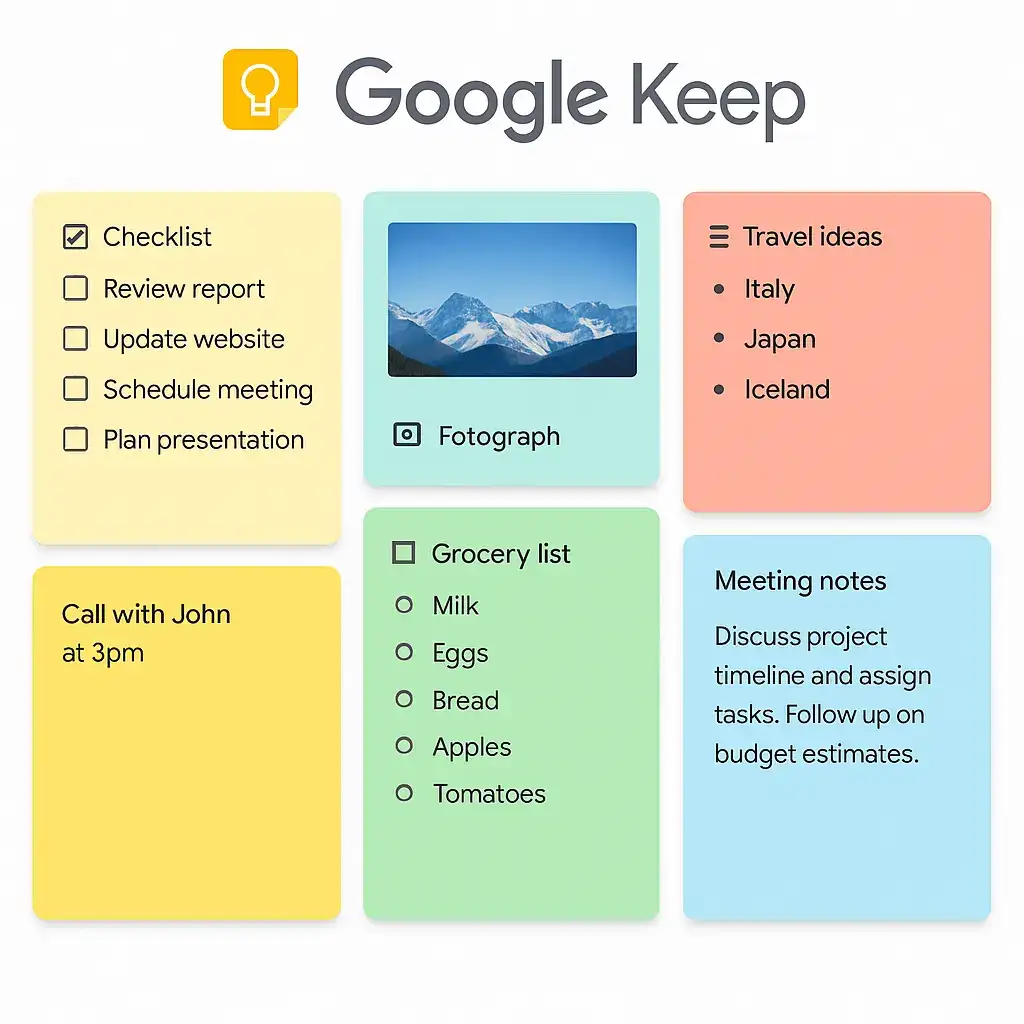
Via your Google account, all your notes are synced immediately and can be set to remind you at a certain place or time.
Pros:
Using it means you can take as many notes as you like for free.
Both simple to work with and very fast to load.
Lets you convert voice input to text and also image text to text.
It is available on web, Android and iOS; you can use it without the internet.
Working together is simple by sharing collaborative lists.
Cons:
The system does not allow notebooks, folders or fancy formats.
Labels are the main way to arrange products in stores.
There is not a desktop app or history of visited pages.
Unsuitable for project types that involve a lot of content
Pricing:
100% free. Notes don’t count against Google Drive storage. No ads, no paid plans.
Comparison Table of Notion Alternatives
Tool |
Starting Price |
Free Plan |
Main Features |
Best For |
|---|---|---|---|---|
Upbase |
$5/user/month |
No |
Notes, tasks, calendar, Pomodoro timer, distraction blocker |
Solo users and freelancers |
Zoho |
$3/month (Notebook) / $4/user/month (Projects) |
Yes |
Note cards, task boards, automation, team communication |
Small business teams |
ClickUp |
$7/user/month |
Yes |
Docs, tasks, Kanban, Gantt, AI assistant, no user/task limits in free version |
Cross-functional team collaboration |
OneNote |
Free / $6.99+ with 365 |
Yes |
Freeform notes, drawing, voice, multimedia, offline sync |
Creative professionals, students |
Evernote |
$7.99/month |
Yes |
Rich notes, OCR, web clips, personal knowledge base |
Knowledge management and archiving |
Google Keep |
Free |
Yes |
Quick notes, reminders, checklists, voice-to-text, sync across devices |
Note-takers in the Google ecosystem |
Final Verdict
Notion is an effective platform for many tasks, but not absolutely for everyone. Whether you're looking for a more intuitive interface, a perfect fit for faster performance, or specific features like offline access or advanced task management, there are plenty of Notion alternatives to consider that emphasize seamless integration and AI features. Each of these tools, Upbase, Zoho, ClickUp, OneNote, Evernote and Google Keep is strong in certain areas for distinct types of workflows.
What you need more of—taking notes swiftly as a student, leading projects in a group, or enjoying advanced features with a simple interface—will make the most suitable choice. Exploring these alternatives to Notion, including Obsidian, can help you find a solution that feels better aligned with how you think, work, and stay organized.
I hope you found the solution that best suits your needs. If you're looking for more comparisons, feel free to check out our blog :)
FAQ
Popular alternatives to Notion include Trello, Asana, and ClickUp. These tools offer various features for project management and collaboration, catering to different needs. Each platform provides unique organizational templates and functionalities, making them ideal choices for teams seeking efficient productivity solutions without relying solely on Notion.
Google Keep is one of the best free Notion alternatives if you need something lightweight and easy to use. It offers unlimited notes, quick syncing, and works offline—all without cost. For more robust features and extra features, ClickUp and Zoho also have generous free plans.
ClickUp is the top Notion alternative for teams in 2025. It combines documents, tasks, whiteboards, and chat—all in one place. Its collaboration features, customizable workflows, and AI-powered ClickUp Brain make it a great option for businesses and remote teams.
Yes. Upbase is ideal for solo users who want a simple interface without team distractions. It combines notes, to-dos, Pomodoro timers, and calendars—perfect for freelancers or focused personal planning.
Yes, Microsoft OneNote and Google Keep both support offline access. OneNote is especially good for taking multimedia notes, while Google Keep is better for quick lists and voice memos that sync later when online.



